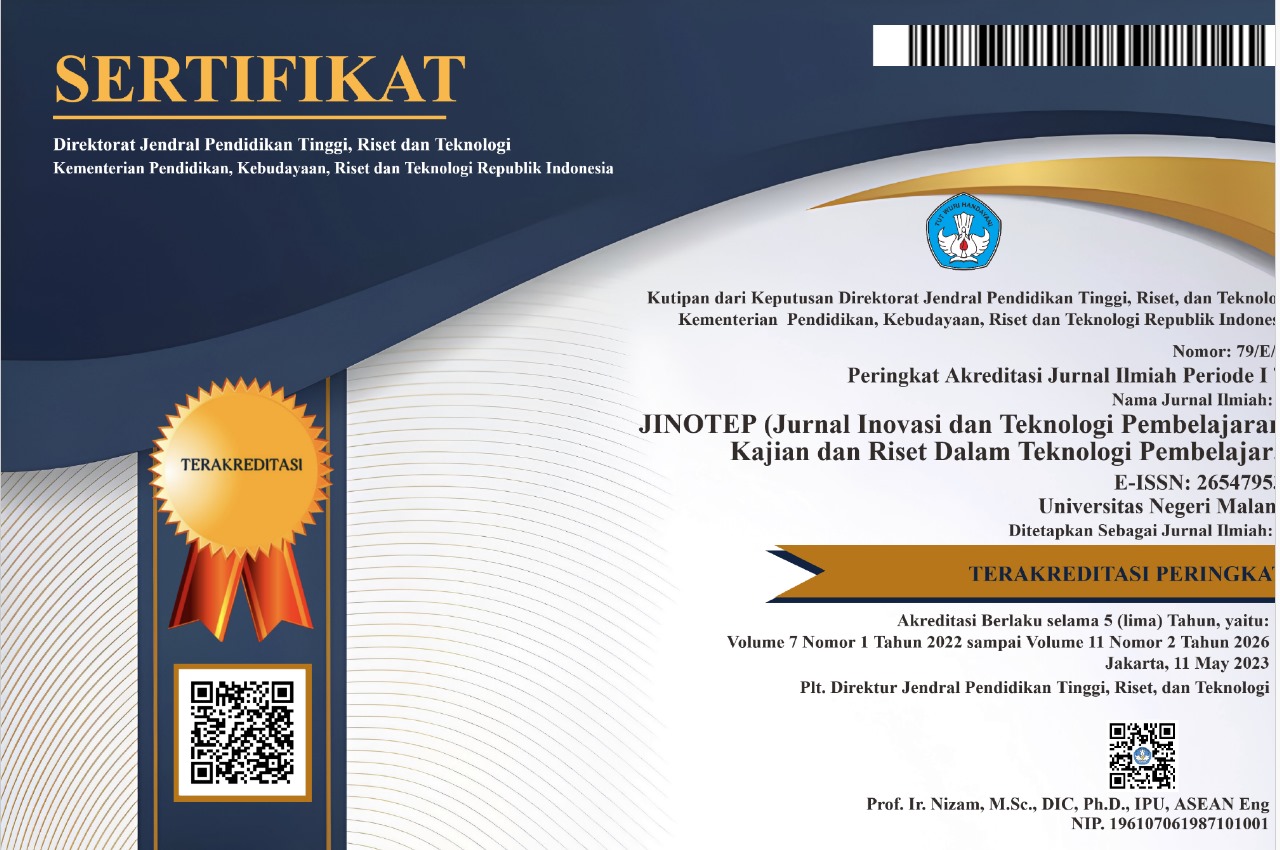Pengembangan Modul Elektronik Berbasis Model Pembelajaran Self Directed Learning pada Mata Pelajaran Pengelasan
Abstract
Abstrak: Penelitian ini bertujuan untuk menghasilkan modul elektronik berbasis model pembelajaran mandiri yang Valid, Praktis dan Eefektif. Sehingga dapat membatu siswa belajar mandiri dan memahami teori pengelasan busur manual SMAW. Penelitian ini adalah penelitian dan pengembangan (R&D) yang mengukur pada model pengembangan instruksional ADDIE. Tahapan dalam prosedur pengembangan ADDIE yaitu Analysis, Design, Development, Implementation dan Evaluation . Hasil Penelitian berdasarkan hasil validator ahli materi dan ahli media, modul elektronik yang dikembangkan valid. Berdasarkan respon guru dan siswa, modul elektronik yang dikembangkan memiliki praktikalitas tinggi.Hasil yang dapat diketahui dari peningkatan pemahaman teori siswa serta uji efektifitas dari materi yang di ujikan dengan hasil yang efektif.
Abstract: This study aimed to produce an modul elektronike based on a self-directed learning model that was valid, practical and effective and was able to help students learn independently and understand SMAW manual arc welding theory. This study is a Reset and Development (R&D) study which refers to the ADDIE instructional development model. ADDIE development procedures namely Analysis, Design, Develop, Implementation and Evaluation. The results of the study are based on the evaluation of material expert validators and media experts, the developed electronic module is valid. Based on teacher and student responses, the developed electronic module has high practicality. The results of effectiveness are known from the increase in the results of students' understanding of the material and the effectiveness test of the material being tested with quite effective results.
Keywords
Full Text:
PDFReferences
Admaja, A. M., Kuswandi, D., & Soepriyanto, Y. (2019). Pengembangan Multimedia Tutorial Untuk Guru Dalam Mengembangkan Software Tes Berbasis Komputer. JINOTEP (Jurnal Inovasi dan Teknologi Pembelajaran): Kajian dan Riset Dalam Teknologi Pembelajaran, 5(2), 63-68.
Arsyad, Azhar. (2016). Media Pembelajaran. Jakarta: Raja Grafindo Persada.
Astuti, I. A. D., Sumarni, R. A., & Saraswati, D. L. (2017). Pengembangan media pembelajaran fisika mobile learning berbasis android. Jurnal Penelitian & Pengembangan Pendidikan Fisika, 3(1), 57-62.
Azwar, Saifuddin.(2012). Reliabilitas dan Validitas. Yogyakarta : Pustaka Pelajar
Bailey, Roxanne, et al.(2019). Self-Directed Learning for the 21st Century: Implications for Higher Education: AOSIS.
BSNP (2010). ParadigmaPendidikan Nasional Abad XXI. [Online]. Tersedia: http://www.bsnp-indonesia.org/id/wp-content/uploads/2012/04/Laporan-BSNP-2010.pdf diakses pada tanggal 11 Maret 2019
Dantas, L. A., & Cunha, A. (2020). An integrative debate on learning styles and the learning process. Social Sciences & Humanities Open, 2(1), 100017.
Diansah, I., & Asyhari, A. (2020). Effectiveness of physics electronic modules based on Self Directed Learning Model (SDL) towards the understanding of dynamic fluid concept. In Journal of Physics: Conference Series (Vol. 1572, No. 1, p. 012024). IOP Publishing.
Dimyati, M. M. (2013). Metodologi Penelitian Pendidikan dan Palikasinya Pada Pendidikan Anak Usia Dini (PAUD). Kencana.
Ekayani, P. (2017). Pentingnya penggunaan media pembelajaran untuk meningkatkan prestasi belajar siswa. Jurnal Fakultas Ilmu Pendidikan Universitas Pendidikan Ganesha Singaraja, 2(1), 1-11.
Fardani, R. N., Ertikanto, C., Suyatna, A., & Rosidin, U. (2019). Practicality and effectiveness of e-book based LCDS to foster students’ critical thinking skills. In Journal of Physics: Conference Series (Vol. 1155, No. 1, p. 012043). IOP Publishing
Hammond, M., & Collins, R. (2013). Self-directed learning: Critical practice. Routledge.Johni
Hashim, H. (2018). Application of technology in the digital era education. International Journal of Research in Counseling and Education, 2(1), 1-5.
Hamid, M. A., Yuliawati, L., & Aribowo, D. (2020). Feasibility of Electromechanical Basic Work E-Module as a New Learning Media for Vocational Students. Journal of Education and Learning (EduLearn), 14(2), 199-211.
Herlina, V. (2019). Panduan praktis mengolah data kuesioner menggunakan SPSS. Elex Media Komputindo.
Hosnan. (2016). Psikologi Perkembangan Peserta Didik. Bogor: Ghalia Indonesia.
Muruganantham, G. (2015). Developing of E-content package by using ADDIE model. International Journal of Applied Research, 1(3), 52-54.
Pratama, L. V. (2019). Pengembangan Multimedia Pembelajaran Teknik Las Dasar Untuk Meningkatkan Minat Dan Efektifitas Belajar Siswa Pada Mata Pelajaran Mulok Teknik Pengelasan Di Smkn 1 Gempol. Jurnal Pendidikan Teknik Mesin, 9(1). Yunus, Y. (2019).
Validitas Media E-Modul Pemograman Berorientasi Objek Ii Berbasis Problem Based Instruction. Curricula: Journal of Teaching and Learning, 4(3), 154-163
Prastowo, Andi. (2011). Panduan Kreatif Membuat Bahan Ajar Inovasi. Yogyakarta: DIVA Press.
Rachmawati, A. D., Baiduri, B., & Effendi, M. M. (2020). Efektivitas Media Pembelajaran Interaktif Berbantuan Web Dalam Mengembangkan Kemampuan Berpikir Kreatif. AKSIOMA: Jurnal Program Studi Pendidikan Matematika, 9(3), 540-550
Rachmadtullah, R., Yustitia, V., Setiawan, B., Fanny, A. M., Pramulia, P., Susiloningsih, W., ... & Ardhian, T. (2020). The Challenge Of Elementary School Teachers To Encounter Superior Generation In The 4.0 Industrial Revolution: Study Literature. International Journal of Scientific & Technology Research, 9(4), 1879-82.
Ruhalahti, S., Aarnio, H., & Ruokamo, H. (2018). Deep learning evaluation in vocational teacher education: Conducted on the principles of authentic and dialogical collaborative knowledge construction. Nordic Journal of Vocational Education and Training, 8(2), 22-47.
Saragih, D. I., & Surya, E. (2017). Analysis the Effectiveness of Mathematics Learning Using Contextual Learning Model. International Journal of Sciences: Basic and Applied Research (IJSBAR), 34(1), 135-143.
Santoso, S. H., & Mosik, M. (2019). Kefektifan LKS berbasis STEM (Science, Technology, Engineering and Mathematic) untuk melatih keterampilan berpikir kritis siswa pada pembelajaran fisika SMA. UPEJ Unnes Physics Education Journal, 8(3), 248-253.
Shanmugam, L., Yassin, S. F., & Khalid, F. (2019). Enhancing students’ motivation to learn computational thinking through mobile application development module (M-CT). International Journal of Engineering and Advanced Technology, 8(5), 1293-1303. dan Riset Dalam Teknologi Pembelajaran, 6(1), 1-7.
Sofyan, (2010), Proses Pembelajaran Inovatif dan Kreatif Dalam Kelas, Metode, Landasan Teoritis, Praktis dan Penerapannya, Jakarta, Prestasi Pustaka.
Sofyan, H., Anggereini, E., & Saadiah, J. (2019). Development of E-Modules Based on Local Wisdom in Central Learning Model at Kindergartens in Jambi City. European Journal of Educational Research, 8(4), 1137-1143.
Song, B. K. (2021). E-portfolio implementation: Examining learners’ perception of usefulness, self-directed learning process and value of learning. Australasian Journal of Educational Technology, 37(1), 68-81.
Sugiyono. (2017). Metode Penelitian dan Pengembangan Research and Development. Bandung: Alfabeta.
Ulyana, A., Abidin, Z., & Husna, A. (2019). Pengembangan Video Pembelajaran Kalor Untuk Siswa Kelas Vii. JINOTEP (Jurnal Inovasi dan Teknologi Pembelajaran): Kajian dan Riset Dalam Teknologi Pembelajaran, 5(2), 81-86.
DOI: http://dx.doi.org/10.17977/um031v8i12021p091
Refbacks
- There are currently no refbacks.
Copyright (c) 2021 Anugrah Agung Ramadhan, Nizwardi Jalinus, Ta’ali Ta’ali, Mulianti Mulianti

This work is licensed under a Creative Commons Attribution-ShareAlike 4.0 International License.
======================================================================
Jurnal Inovasi dan Teknologi Pembelajaran published by Universitas Negeri Malang in collaboration with the Asosiasi Program Studi Teknologi Pendidikan Indonesia (APS TPI) and Ikatan Profesi Teknologi Pendidikan Indonesia (IPTPI) with a MoU.
Publisher Address:
Educational Technology Laboratorium, Building D5, 1st Floor
Faculty of Education, Universitas Negeri Malang
Semarang St. No. 5, Malang City, East Java Province, Postal Code 65145
Email: jinotep.fip@um.ac.id
======================================================================

JINOTEP is licensed under a Creative Commons Attribution-ShareAlike 4.0 International License.
JINOTEP Statistics (Since July 13th, 2020)



.png)




.png)
1.png)
1.png)
4.png)
2.png)
1.png)
1.png)
.png)


_3.png)





1.png)
.png)